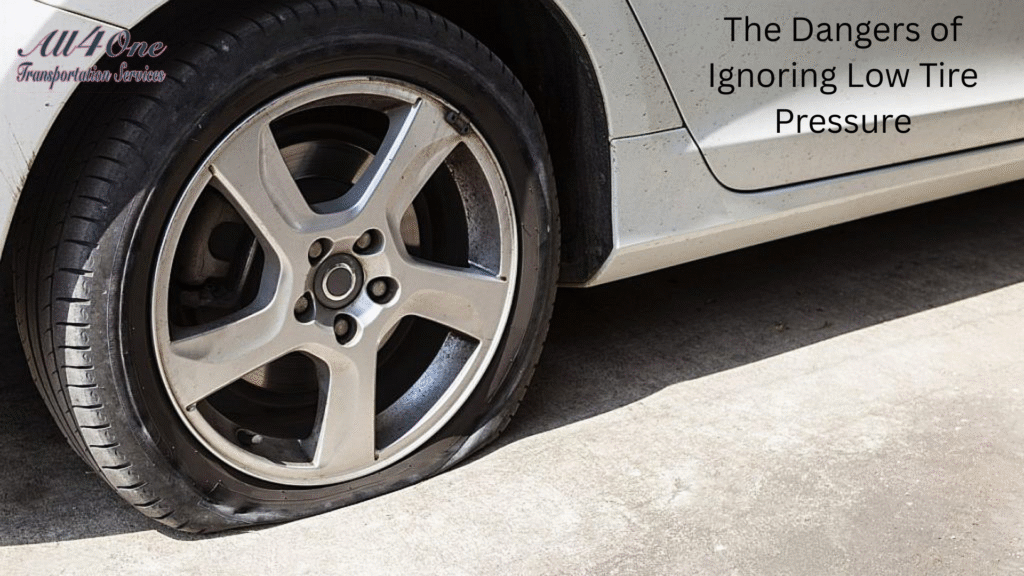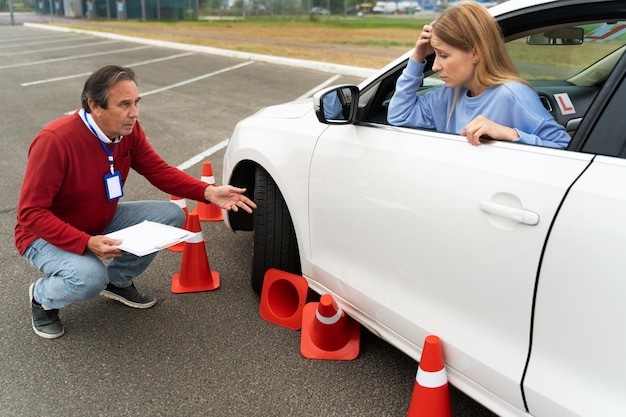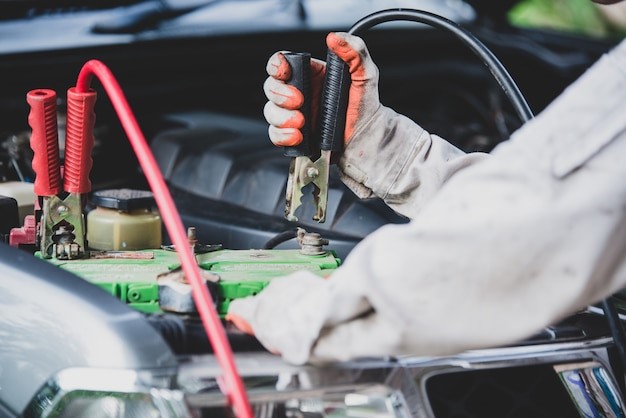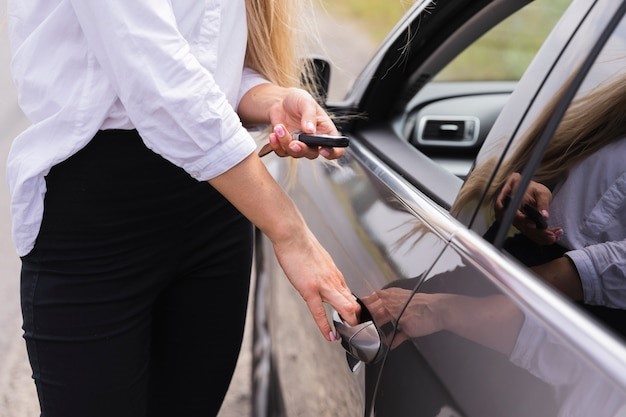When most of us think about keeping our cars, passengers, or ourselves safe on the road, we usually focus on safety features like seat belts, brakes, and airbags. But there are, however, sources of potential hazards that rank among the most critical but happen to be as rudimentary as tire pressure. Driving on underinflated tires might seem like a minor problem, but it’s actually potentially dangerous for you and others.
In the large Georgia town of Allenhurst, high-speed roads with few houses and lots of traffic mean you’re at risk for tire failure if you don’t stay up-to-date on pressure checks!
Why is Low Tire Pressure Dangerous?
An underinflated tire does more than make your car cushy on the road. It changes the way your car drives and introduces risk to the road. Here’s why:
- Decreased control – An underinflated tire does not perform well on the road, and it becomes harder to maneuver or stop.
- Greater potential for blowouts – The softer a tire is, the warmer it becomes, and the section of a tire that gets warmest during operation is its edges.
- Worse fuel economy – Low air pressure increases rolling resistance, so your vehicle has to use more gas while you drive it.
- Shorter tire life – When you run the tires under-inflated, they wear unevenly and their lifespan is reduced.
These threats are overlooked and can create dangerous situations on Allenhurst highways in no time.
What Happens When You Drive With Low Tire Pressure?
Under-inflated tires can’t hold up the vehicle like they should. Instead of running flat on the tread, as it would with a standard well-supported rim, the tire droops over a bit and stresses its edges. Over time, this creates:
- Uneven wear and tear
- Poor traction, especially in the rain
- Longer stopping distances
- More prone to spinning out during sharp turns
These risks make low tire pressure a real safety concern for Allenhurst drivers, especially those who drive regularly on highways like I-95 or around Liberty County.
The Dangers of Ignoring Low Tire Pressure in Allenhurst

While low tire pressure may not sound like a major issue, for drivers in Allenhurst, GA, this cause of concern can cause more issues than simple frustration. Tires that are not inflated to their recommended pressure simply do not perform as well. This can quickly lead to dangerous road conditions – especially on the less-frequented rural roads, highways, and long daily commutes that many Allenhurst residents face.
Here are some of the specific hazards of ignoring low tire pressure and why there’s no reason not to keep an eye out for your tires.
1. Risks of Low Tire Pressure Driving in Allenhurst
If you drive on low tires, your car doesn’t respond the way it’s supposed to. It’s not as focused when you steer, it doesn’t stop quite as quickly, and your tires have a slightly looser grasp of the road surface. This can be especially dangerous in a town like Allenhurst, where the weather and roads can change rapidly.
On a smooth city road, low tire pressure can make your car feel a little lazy. But if you have potholes or iffy seat-of-the-pants traction on rural back roads — or heavy rain, with which we’ve been particularly blessed this year — underinflated tires can hinder your ability to keep a vehicle under control. All of this, naturally, increases the likelihood you will slip and slide, or even crash.
2. How Underinflated Tires Cause Accidents in Allenhurst GA
Underinflated tires are more likely to bend and flex than they should, particularly when a car is moving. All of that repeated flexing generates a little more heat and changes the way in which the tire contacts the road. The result? Reduced control and poor handling.
Imagine this: You are zipping along Allenhurst at the height of rush hour, and out of nowhere, a car materializes right in front of you. If you have under-inflated tires, your car needs longer to come to a stop and your car might not react quickly enough. And even a hairbreadth divergence of the split second would ensure disaster.
3. Effects of Low Tire Pressure on Fuel Economy in Allenhurst
Low pressure in tires is a problem we all think about, one more thing on our minds as motorists. When the tire pressure is low, they generate increased rolling resistance so the motor has to work more in order to maintain your car on cruise.
Driving on low tires can decrease fuel economy up to 3%, automotive experts say. It may not seem much at first blush, but for the exhausted commuters of Allenhurst who drive there every day to work in the towns clustered around and the military bases that surround it, they can add up quickly. Neglecting tire pressure, over the course of a year, floats away hundreds of dollars in fuel savings down the road.
4. Tire Blowout Risk From Low Pressure in Allenhurst GA
Blowouts are the most dire of the perils. An underinflated tire generates more heat while it is being driven. Ultimately, that heat can lead the tire to explode with little warning.
A blowout at a slow speed is scary; one on the highway near Allenhurst or when you’re traveling on I-95 can be fatal. Blowouts can infuse a feeling of control loss in drivers immediately, casting all the occupants of a vehicle and those driving nearby into serious jeopardy.
5. Warning Signs of Low Tire Pressure in Allenhurst GA
What this means is that your car and tires are usually good about giving you little hints before things get out of hand. Knowing what to look for will save you from expensive breakdowns and last-minute roadside emergencies.
Here are the most common red flags:
- Visibly flat tire – A single tire appears to have low pressure, or is “flat.”
- Sluggish steering – The vehicle is heavy in your hands or doesn’t want to go on its intended path.
- TPMS light – You notice that the Tire Pressure Monitoring System light on your dashboard is illuminated.
- Squealing tires – The tires screech when taking a corner more frequently than normal.
If you see any of these, best to stop and check your tire pressure right there.
6. Why You Shouldn’t Ignore Tire Pressure Alerts in Allenhurst
Modern automobiles are fitted with sensors that make it easy to know when things aren’t right. The Tire Pressure Monitoring System (TPMS) is designed to provide early warning of underinflation.
The truth is, most of the drivers in Allenhurst that notice this light do just that. That’s a small decision that can be expensive. Disregarding TPMS alerts can cost you tread wear and tire damage as well as gas money and repairs. It can strand you, but more importantly, it can make a wreck.
When your TPMS light illuminates, it’s a big deal. Whether you can tell the tire is slightly less inflated or not, you’ll be better off if you get it taken care of as soon as possible.
7. Low Tire Pressure Roadside Emergency in Allenhurst GA
When tire pressure goes unattended and ignored, it tends to culminate in a roadside emergency. A flat, or a blowout, can occur anywhere — on some back road outside Allenhurst, down the street of an urban place. All at once, you need assistance and your plans are disrupted, or your safety is on the line.
That is why it is so important to have a reliable local roadside assistance company. In Allenhurst, places like All 4 One Transportation do emergency tire inflation, change flat tires and tow cars. Never fear being left stranded with our 24-hour roadside service.
How Much Does Emergency Tire Air Refill Cost?
The price you are charged for emergency tire air service in Allenhurst, GA varies based on a few things:
- Mobile roadside service – Refueling service starts at about $40, depending on where you live.
- Full roadside assistance packages – If you want more than just air (like a lift and tow or jumpstart), prices can climb, from $75 to $150.
- DIY gas station refill – The cheapest option (typically less than $2), but only if you haven’t completely ruined your tire and can make it to a gas station.
Yes, emergency services cost more than a gas station pump, but when you’re stranded late at night or way out of town, they are certainly worth it.
Benefits of Keeping Tires Properly Inflated
Keeping ahead of tire-pressure issues is simpler than most drivers realize. Some benefits include:
- Better safety – Reduced chance of skids, accidents, and blowouts.
- Improved fuel economy – up to several miles per gallon.
- Longer tire life – Keep your tires from wearing out prematurely.
- Smoother rides – A car’s traction and the way it handles are significantly improved when tires are properly inflated.
Tips to Avoid Low Tire Pressure Problems
Here are a few easy tips for Allenhurst drivers:
- Check tires monthly – Check tire pressure using a tire gauge once per month.
- Know your PSI – Your vehicle owner’s manual has the proper tire pressure (typically 32-35 PSI).
- Inspect before long drives – Before going on a long drive, always inspect your tires
- Respond to TPMS alerts immediately – Whatever is obstructing your TPMS it is not worth the risk of your suspension.
- Call local roadside help if needed – When stranded, turn to a reputable provider in Allenhurst.
FAQs
Yes, but it’s not safe. Short trips can ruin your tires, too.
At least once a month, and always before long drives.
There you risk blowouts, poor fuel economy, and expensive tire damage.
No, but you will have your TPMS light on.
There are companies like All 4 One Transportation that offer fast, dependable service and roadside tire inflation.
Low pressure feels dead, but a flat will typically cause the car to suddenly pull hard to one side.
Conclusion
It doesn’t take much for Allenhurst drivers to feel that something is wrong with their vehicle, particularly when they’re rushing around on the expressway. From wasted fuel and irregular tire wear to blowouts and crashes resulting, neglect in this area increases risk. The great news is that, with a regular inspection and reliable roadside assistance, you can prevent these hassles and stay safe on the road.
For more information about the latest and most dependable roadside assistance, check out All 4 One Transportation now.




